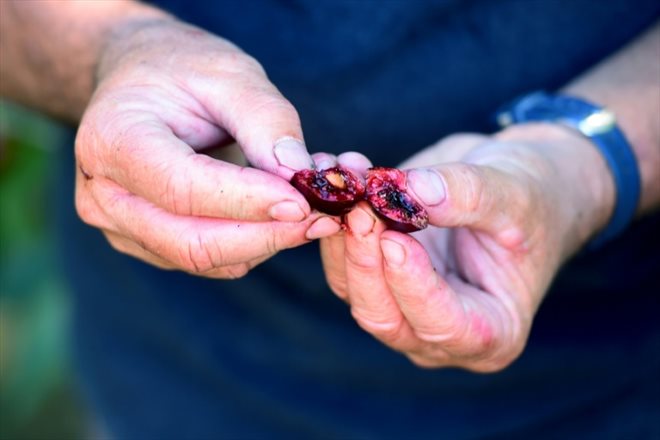A cherry affected by the Suzukii fly, on June 22, 2018 in Prayssas, in Lot-et-Garonne (AFP/Archives/NICOLAS TUCAT)
A “permanent state of stress” and a lot of “discouragement”: cherry growers warned Thursday of the losses attributed to the attacks of a midge against which they are struggling to fight since the ban on an insecticide.
About fifteen cherry producers unloaded a ton of damaged fruit very early in front of the sub-prefecture of Tournon-sur-Rhône, in Ardèche, they reported to AFP.
“The situation is becoming unmanageable for the producers. The idea is to alert the government, to say: put in place the safeguard plan that you have planned, (…), give us solutions”, a explained Benoît Nodin, secretary general of the majority union FDSEA in Ardèche.
They demand compensation but above all “a dignified and effective solution that [leur] allow you to live [leur] production”, because “we cannot redo a year like the one we are experiencing”, he underlined.
They are affected by attacks from Drosophila suzukii, a tiny invasive midge that arrived in France about ten years ago. The insect reproduces at lightning speed and lays its eggs in ripe red fruit, especially when the weather is hot and humid.
The impact is especially felt for the latest varieties, the producers evoking “30 to 40% losses compared to what is on the cherry trees”, according to Mr. Nodin, whose orchards are located in Saint- Péray, in the north-east of the Ardèche.
According to Sylvain Bertrand, of the Young Farmers union, “some producers” even accuse 100% of losses.
– “Infernal life” –
Faced with “the urgency of the situation” and “the distress of the producers”, the Ministry of Agriculture says it is mobilized “to assess and document the losses”. The government “is currently studying the support, of any kind, that it could provide,” the ministry said in a statement.
Arboriculturists have been warning for months about the consequences of the banning of a molecule, phosmet, used to fight against Drosophila suzukii.
The European Commission refused in early 2022 to renew its approval due to “unacceptable risks for operators, workers, passers-by and residents”, pointed out by the European Food Safety Authority (Efsa). The decision also noted “a high acute and chronic risk to consumers” as well as wildlife.
The producers had already denounced the 2016 ban on dimethoate, which was also deemed toxic by health authorities.

A producer shows a cherry attacked by a gnat in Prayssas, Lot-et-Garonne, June 22, 2018 (AFP/Archives/Nicolas TUCAT)
They believe that the insecticides they have left are not effective enough, while they also have to deal with the Mediterranean fly which has not “bothered” them for “50 years”, according to Sylvain Bertrand.
“We did a whole bunch of experiments, with repellents based on garlic, essential oil of ferns, massive trappings. We also use Exirel” – a product which was authorized by way of derogation from an increased dose – and an insecticide of plant origin, pyrethrum, “but clearly it does not work”, affirms the president of the Young Farmers of Ardèche, arborist in Bozas.
“The last solution proposed is the sterile insect technique [qui consiste à élever en laboratoires des moustiques mâles, à les stériliser, puis à les lâcher sur le terrain, où ils vont stériliser les femelles sauvages, qui n’auront pas de descendance] but it still requires two years of experimentation. (…) What do we do in the meantime?” asks Benoît Nodin.
“We have a hellish life on our farms,” describes the 49-year-old producer. “In the morning, we get up at 5 a.m. to pick the fresh fruit. During the day, we do the work of sorting, shipping and in the evening, we take care of the sanitary facilities in our orchards. We are tired, in a permanent state of stress.
The producers are “discouraged”, sums up his thirty-something colleague.
They should “give us tools that work so that we can work calmly”, plague Olivier Curel, of the FDSEA of Vaucluse. “There, it is non-assistance to a profession in danger.”
© 2023 AFP
Did you like this article ? Share it with your friends with the buttons below.




